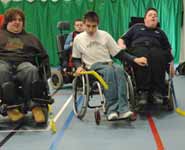The research, which was conducted by academics at the School for Policy Studies in partnership with the Muscular Dystrophy Campaign and the Duchenne Family Support Group, has led to the publication of three new guides for young men with DMD, giving advice and guidance through the difficult transition period moving from childhood into adulthood.
Advances in medical technology resulting in increased life expectancy have meant that a generation of young men with DMD are alive who were not expected to be. Many have reached, or are reaching, stages of adulthood that were, at the time of their childhood, largely unexpected.
Despite these medical advances, a lack of proper support means that many young men with DMD struggle to lead meaningful lives once they have finished full-time education.
Key findings of the research showed that:
- although around half the families were involved in some planning for transition from school and from children's to adults' services, there was a stark absence of examples of formal transition planning as is required by law and government guidelines;
- all but three of the 40 families interviewed described their overall experience of service provision as problematic. Families noted that having to constantly prove their needs and the difficulties faced in getting them met were protracted and acrimonious processes;
- 80 per cent of parents reported clinical levels of anxiety and depression. Most had been woken by their son every night during the previous week (average 4.6 nights a week);
- most young men had very limited social opportunities or friends beyond their immediate family. Only one had any experience of paid work. Others who had looked for work had faced insurmountable obstacles;
- a third of young men were at home during the day and not doing any kind of education, training or work. Most felt that being at home was not stimulating enough and their parents agreed;
- two thirds of parents had insufficient information about the options for what their son could do next in life;
- there were wide geographical variations in the nature and level of support available to families in terms of care packages provided. Most parents were still providing a lot of physical care and support;
- both young men and their parents said that they tended to 'live for the day', in a large part because the future was so uncertain. There was a strong desire to 'get on with' the ordinary business of family life;
- young men with DMD, their siblings and parents demonstrated huge resilience in the face of some extraordinary challenges. Relationships within families were often extremely close, mutually supportive and characterised by warmth, humour, and an overwhelming desire to 'lead a good life' despite the obstacles they faced.
27 year old Stuart Reid who has DMD, said: "It does seem to be that before you're 16 there is a plan - then you get to a certain age and no-one's thought about what happens next. It's as if some people think, 'Oh you're still around, you shouldn't be, we don't know what to do with you'."
David Abbott and Professor John Carpenter, the report's authors, added: "We were shocked at the extent of the difficulties that young men with DMD faced and the lack of support which many families were receiving. We don't want to evoke pity; empathy and a degree of anger would be more appropriate. The challenge is to ensure that their potentially shorter lives are no less valuable - and just as fulfilling as any others in our society."
Lyn Inman, Director of Care and Support for the Muscular Dystrophy Campaign said: "The Muscular Dystrophy Campaign backs this crucial study into transition to adulthood for young men with Duchenne muscular dystrophy. We have produced this report summary to challenge service providers in the NHS, social services and education to act upon its findings. Young adults with muscle disease should be able to expect the same high-quality services as are increasingly being received by children with muscle disease."
The three reports, Becoming an Adult: Transition for Young Men with Duchenne Muscular Dystrophy, Guide to Transition for 13-25 years olds with muscle disease and Becoming a Man: Life with Duchenne muscular dystrophy are all available from the Muscular Dystrophy Campaign.
